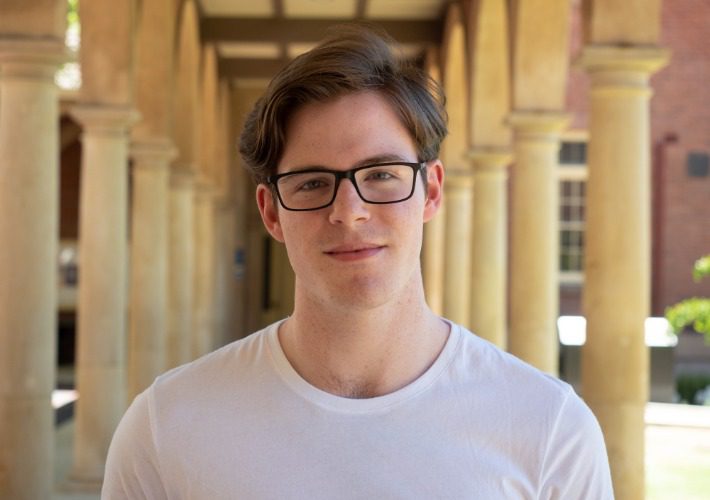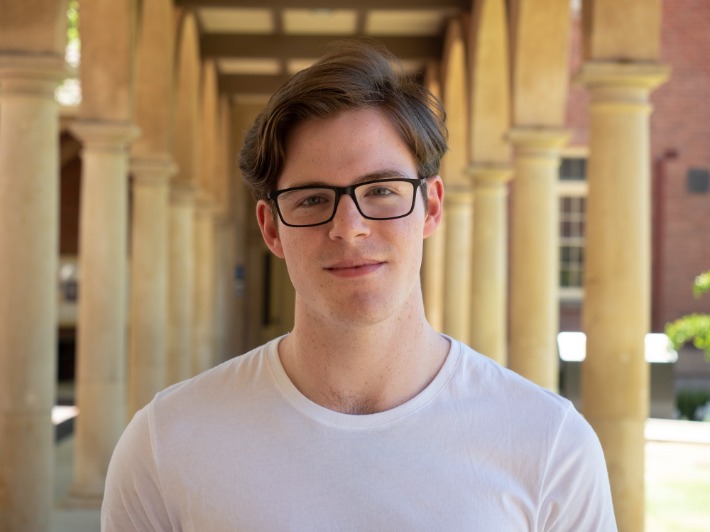
Finding the Story in the Music
AYO Composition alumnus, Alexander Voltz has been busy lately. Between juggling new commissions and opening a brand-new opera in his hometown of Brisbane, Alexander chatted to us a bit about his inspirations, what drew him to the art of composition, and a little bit about his experience at AYO National Music Camp.

When did you start composing your own music?
When I was about seven or eight, my family started to go camping near Lake Cootharaba. I would amuse myself by taking blank pieces of paper, drawing up staves and squiggling to my heart’s content. I rediscovered a folio of this “music” only the other day; I think it is safe to say that my first compositional forays more closely resembled visual art!
What drew you to composition?
Fast-forwarding a few years, I saw Piers Lane and the Queensland Symphony Orchestra perform the Grieg Piano Concerto. The concert had a profound impact on me. I walked away wishing, in less articulate terms, that I could somehow contribute to the great canon that is Western Art Music. Years later, I enjoyed a wonderful secondary education by way of an arts scholarship to Brisbane Boys’ College, where I was encouraged to explore music, drama, literature and history. All these things paved the way for me to pursue a career in composition.
What are your main inspirations?
I describe my work as being largely informed by myth, politics and the historic, whilst also attempting to deconstruct the human condition. In other words, my music will often have some sort of outer quality, like a story, character or tangible theme, mixed with inner philosophic subtleties. A good example might be Mirage, a 2018 solo piano work. Mirage outwardly depicts some poor soul lost in a desert, and inwardly reinforces the human journey as primarily being one of exciting struggle. I suppose you could say I apply theories of narratology to my composing. But, that said, I strongly reject the proposition that all music should be programmatic. A composition’s structure can be just as compelling as its extra-musical plot.
You’ve been very busy recently! What are some of the projects that you’ve been working on? Can you tell us a little bit about them?
I have been very fortunate recently. Most notably, my chamber opera, Edward and Richard: The True Story of the Princes in the Tower, premiered last Thursday in my native Brisbane. Directed by Michelle Carey and conducted by Bradley Voltz from the piano, the opera starred soprano Susan Ellis as Elizabeth Woodville, Queen Dowager of England, and offered a new theory as to the fate of the Princes in the Tower. It was well received by an enthusiastic audience and, as a work of history, has attracted international attention. Otherwise, I am hard at work on my ANAM Set commission from the Australian National Academy of Music. My piece for violinist Emily Beauchamp – whom incidentally I met at National Music Camp last year – laments the tragic passing of a friend of mine. In September, I am looking forward to working with the indomitable Flinders Quartet as part of their Composer Development Program. They will be premiering and recording my First String Quartet, shortlisted in Budapest during the 2020 Bartok World Composition Competition. Additionally, I have several other projects simmering away, either on my desk or in my mind.
You were part of the composition program at National Music Camp in 2020. How did you find the experience?
Absolutely seminal. National Music Camp was the first intensive composition program I had undertaken, and I am so pleased I did. In only two weeks, my technical knowledge exponentially increased, in no small part due to a series of seminars led by tutors like Melody Eötvös, Jacinta Dennett, Robert Cossom, Alex Timcke, William Barton and Karina Filipi. I really do greatly appreciate the time these individuals invested in developing a novice’s compositional skills. Musical matters aside, I met so many incredible participants from all over Australia. I still speak regularly with my AYO flat mates, fellow composer Victor Arul and sound engineer Daniel Young.
Is there anything you would say to someone who was thinking of applying to an AYO program?
Take spare strings! And apply when you are comfortable. There is no need to be impatient, just as there is no need to hold off unnecessarily. Regardless of your age and experience, if you feel you are ready to enter into the AYO family then do. I will certainly welcome you with open arms and can promise you a fantastic adventure.